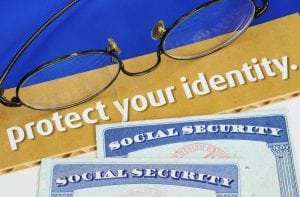Tips for Avoiding Identity Theft While Traveling
When on vacation you are soaking in the scenery and new experiences and your guard may be completely down, even just temporarily. Criminals typically take advantage of tourist’s relaxed guard and tend to specifically target them. Stay ahead of thieves by taking a few precautions and don’t fall victim to identity theft when on vacation.
Identity thieves specifically target certain types of personal information including; name, credit and debit account numbers, Social Security number, date of birth, and driver’s license number, addresses, passport numbers etc. Fortunately, there are several things you can do during your travels to safeguard your personal information and ensure you aren’t amongst the next group of victims. Here is a list of a few tips to consider.
Before You Leave on Your Trip
Tell Your Bank and Credit Card Issuer Where and When You are Traveling
Before you leave on your trip, call and inform your bank and credit card companies you are going to be traveling. If possible, give them dates and destinations. Most institutions are happy to monitor your accounts, as they do not want to be liable for any stolen sums.
Use Pin Based ATM Cards Only
Use a pin-based ATM card only, rather than a check or debit card. Check and debit cards can be used without a pin to make purchases. This way if your card is compromised, it is worthless to the criminal and they won’t have direct access to all of your funds in your checking account. Protect your account even further by placing your cards in an RFID blocking card case.
Make Sure You Pack a Credit, not Debit Card
If you aren’t using cash while traveling, use a credit card instead of your debit card. If someone gets your debit card number you’ll likely lose all the money in your account, and the process of reversing the fraudulent charges can take a lot longer. If someone steals your credit card you’ll have an easier time recouping your losses, especially if you have an identity theft protection plan from your card holder.
Stop Your Mail
You may think it’s a great idea to simply have a neighbor pick up your mail while you’re out of town but if a thief is casing your neighborhood he’ll eventually figure out you aren’t home and beat your neighbors to the mailbox anyway. Go to the post office or on-line and stop your mail while you’re away. Your mail, which could include Social Security statements, pay stubs, and tons of other personal information, will be safe until you return. An alternative is to install a security mailbox where letters are dropped inside the steel box via a slot and the bulky junk mail is placed on a non-secure shelf. We have one and it is great for short trips.
Leave it at Home
Will you really need your checkbook and extra credit cards? Sanitize your wallet and remove anything and everything you will not be using on your trip.
Limit Bag Tag Information
Do you really need to put your full name and address on the luggage tags with steel loops you attach to your bags? Probably not. If someone gets a hold of your bag he’ll have your name and address AND he’ll know you’re not home. Put your name and phone number and leave it at that. An honest person will call you if he finds your bag. A thief won’t care either way but at least he won’t know where you live.
Bills, Bills, and More Bills
Pay your bills prior to departure for vacation. Do not take bills along with you; hotels are dangerous places to leave bills because the account information printed on them is readily available to anyone. This is a serious threat to your identity. Another tip that everyone should be doing with bills is to make sure old ones are shredded, rather than being tossed into the garbage – Always make sure you minimize your exposure to account information that you throw in the trash. Know that another breed of ID thieves sift through trash in search of these materials.
Do You Really Need to Be Connected While on Vacation?
Do you really need your laptop on a pleasure trip? If not, leave it at home. The world won’t end if you don’t check your email while lounging on the beach in Hawaii. If your laptop is the computer you use primarily it likely has a lot of personal information, including financial and passwords, and if it is lost or stolen you could easily become the victim of identity theft.
Forget Facebook
Never, under any circumstances, post a status on Facebook to let your friends know you’re on vacation. You wouldn’t put a sign on your front door announcing you’re away and, as such, you shouldn’t announce it to the Internet world. Someone who breaks into your house will have access to tons of identifying information. The same applies to MySpace, Twitter, and any other social networking service you use.
Keeping your Identity Secure While Traveling
Keep Track of Boarding Passes
Once you’re on a plane you might think your boarding pass is no longer important and, as such, inadvertently lose track of it. Put your used boarding pass right back in your purse, wallet, or carry-on. It has a lot of identifying information on it and if it falls into the wrong hands it will announce your absence from home.
Leave it in Your Hotel Room
When you are out an about, do you really need to carry certain documents with you or can they be left in your hotel room safe. Carry the money and credit card you need for the day. Leave your passport, extra traveler’s checks, and additional credit cards in your room safe to lower your risk of ID theft – carry only what you think you’ll need. If you do become a victim you’ll lose less and your attacker will have access to less information than if you were carrying all of your identifying information.
Is Your Laptop Up to Date?
If you take your computer with you, update your anti-spyware and anti-virus programs before you leave, as you will be connecting to possibly unsecured Internet connections, a haven for ID thieves. If you are using your computer on vacation, do not access your personal accounts from your hotel room or Internet café; publicly available Internet connections are a common source of identity theft. This is because they are generally unprotected signals with a high volume of usage.
Avoid ATM Machines
If you need money you are better off visiting a local bank than you are using an ATM machine in your destination country. Thieves constantly monitor ATM machines in an attempt to skim PIN numbers or blatantly take your cash after you’ve made a withdrawal. Check your surroundings, make sure the ATM doesn’t have any strange attachments above or below the card slot, make sure no one is nearby with a cell phone camera, and make sure you cover up the keypad as you type your code.
Use RFID Blocking Gear to Protect Your Identity
Most credit card companies now issue credit cards which contain Radio Frequency Identification (RFID) technology that lets you simply wave your credit card, passport or license in front of a nearby scanner instead of having to slide the magnetic stripe through it. It’s a fairly simple concept. The electronic scanner sends a signal which is received by an antenna embedded into the card, which is connected to the card’s RF chip, thus activating it. The information transmitted is personal identity and financial information.
This technology allows an RF-enabled card to be “hi-jacked” by tech-savvy identity thieves who use hand-held scanner devices. By standing close to you in a crowd the device can read and capture your data.
To protect your RFID enabled credit cards and passport cards, you should travel with RFID blocking wallet or RFID blocking sleeves to protect your identity Click here, to see RFID blocking wallets and document organizers.
Never Let Your Card Out of Sight
Another great way to avoid identity theft is to never let your credit card go out of your line of eyesight. If the waiter, or gas station attendant, or concierge (or anyone else), has to leave your line of vision the odds of him running your card twice and only giving you one receipt are significantly increased. They might even simply make a photocopy or take a cell phone picture of your card for later use. It can and does happen.
Your vacation should be a dream come true – not a nightmare. Unfortunately, there are no guarantees that your identity will not be stolen while traveling. Even the most diligent and conscious people become victimized by ID theft. Know that most thieves are lazy, and will take what is easy to access over what they must work harder for- use that to your advantage by staying ahead of the game.
Stay Informed Before You Go with Our Information-Rich Newsletter










